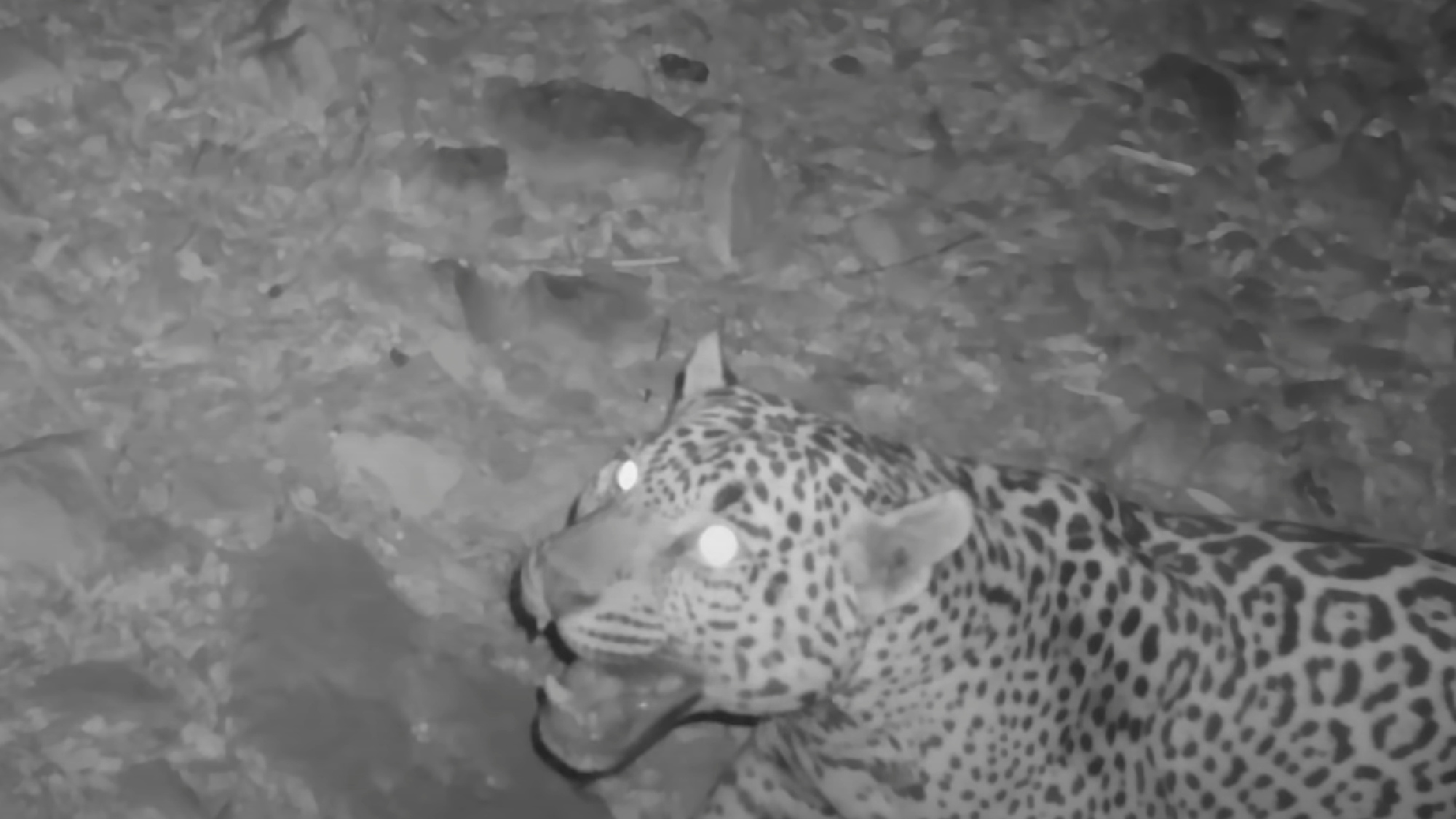The jaguar’s unique spots were proof that wildlife officials in the state hadn’t seen it before

The jaguar momentarily bared its teeth at the camera before carrying on with its night. Jason Miller Outdoors / YouTube
On Jan. 3, wildlife photographer Jason Miller posted new trail camera footage from the Huachuca Mountains near Tuscon, Arizona to his YouTube channel, Jason Miller Outdoors. The latest video contained a sighting that Miller has been chasing for half a decade.
“Five years ago, I started running trail cameras for wildlife footage here in southern Arizona, hoping one day maybe I’d get a jaguar,” Miller says into the camera. “I was fortunate enough to get an ocelot the last several years. Just north of the Mexico border in a deep canyon, on Dec. 30, I was hiking up checking some cameras. I set up some cameras overlooking this mountain lion scrape, hoping to get a lion. Well, I got lots of wildlife, including my first jaguar.”
After Miller shares footage of mountain lions, bears, javelinas, and a ringtail, which is Arizona’s state mammal, he plays the jaguar footage that his camera captured on Dec. 20. The jaguar stays near the bottom right side of the screen and bares its teeth at the camera.
After a five-person team from the Arizona Game and Fish Department inspected the footage, they determined that the jaguar is a never-before-documented individual, AZGFD public information officer Mark Hart tells Outdoor Life. The series of flower-like spots near the jaguar’s shoulder blades (known as rosettes, which are unique to each individual like a fingerprint) is unlike any other specimen seen in the state. This makes Miller’s spotting the eighth known jaguar to set foot in the U.S. since 1996, a year before the U.S. Fish and Wildlife Service reclassified the species as endangered.
“It looks like we’re in a new era,” Hart says. “In the past, say back in the nineties, the only time we knew about the presence of a jaguar was if someone saw it, or if they saw scat, sign, a track. Since 2016, all the newly identified individuals came to us by way of trail cams, which is significant.”
This detail should preclude anyone from claiming more jaguars are coming into the U.S., Hart says. More trail cameras likely means more eyes seeing the same limited number of jaguars.
While it is unclear if the newest cat was male or female, the other seven jaguars have all been male. In 1963, a hunter killed the last known female jaguar in the U.S. when he thought it was a bobcat. Six years later, officials prohibited jaguar hunting in Arizona. Now, some wildlife advocacy groups have discussed and even petitioned for a jaguar reintroduction, although the idea hasn’t gotten much traction recently.
Read Next: Watch a Bobcat Hunt a Rabbit on a Busy Golf Course
Jaguars are the largest big cat in the Americas and the third biggest on the planet after lions and tigers. All jaguars spotted in the southwestern U.S. are likely dispersing from the northern Mexico state of Sonora, home to a breeding population of some 200 jaguars. Hart recalls two instances when jaguars spotted in the U.S. were later confirmed back in Mexico, one through a spot analysis done on a photo of a hide taken by a predator control agent and one through more trail camera footage. The latter was a jaguar known colloquially as “El Jefe” that made headlines after multiple sightings in the early 2010s.
Hart expects more photos and footage of the latest jaguar to show up in the coming weeks, whether from Miller or other wildlife enthusiasts. Either way, Miller should be proud of what he’s accomplished with this sighting, Hart says.
“That was hard for him to do,” he says. “He had to spend hours in the field and get into some pretty remote locations, and then go back and pull [the footage]. But he was very determined about capturing a jaguar video, and he did it.”
